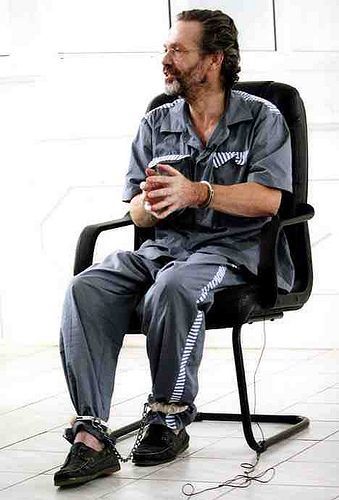
You wouldn’t know it from the American newspapers, but if you click on virtually any British news site today (try here, here, and here), you’ll read of a courtroom drama currently unfolding in Malabo, Equatorial Guinea, in which British mercenary Simon Mann is casting blame far and wide for the failed 2004 coup plot that aimed to topple the local dictator, President Teodoro Obiang Nguema Mbasogo.
Details of the coup itself are already widely known, the subject of numerous magazine articles and several books, but in case you missed it: In March 2004, Mann was arrested along with 70 other mercenaries while their plane was refueling on the tarmac of an airport in Zimbabwe during a brief, late-night stopover while en route from South Africa to Equatorial Guinea. The mercenaries were carrying with them 61 AK-47s, 20 light machine guns, 50 heavy machine guns, 100 RPGs, along with tens of thousands of rounds of ammunition—equipment they said they intended to use to secure a mine in the Congo. The Zimbabwean authorities didn’t buy it, and Mann spent the next several years in a Harare prison. He was later released for good behavior, but immediately extradited to face criminal charges in Equatorial Guinea, where, if convicted, he could serve up to 32 additional years in prison.
Today in the Malabo courtroom, testifying in his own defense, Mann seemed eager to bring down his co-conspirators, if only perhaps to lessen his own sentence. The Eton-educated, former British special forces officer gave detailed accounts of the plotters motivations—namely, to replace Obiang with a new president who would give conspirators a cut of the country’s sizable oil wealth—as well as the leadership structure of the conspiracy.
Among Mann’s accusations:
Both the Spanish and South African governments quickly denied Mann’s allegations, but, says Mann, “their involvement was clandestine, and they will never admit it.” Meanwhile, Thatcher and Calil remain free.
Photo used under a Creative Commons license from Podknox.













